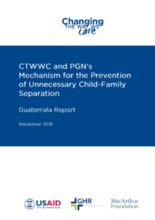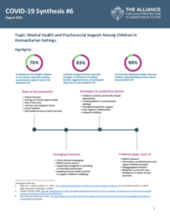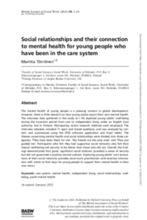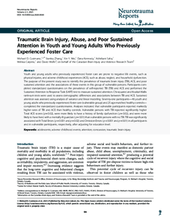Displaying 71 - 80 of 525
This report includes the key lessons learned and the achievements resulting from CTWWC/PGN follow-up and family and economic strengthening activities provided to 18 families, along with information about 66 children and adolescents who remained with their family and community environment. The project also raised families’ awareness about the importance of providing children with safe and protective settings to foster their wellbeing through positive and loving parenting.
The purpose of this evidence synthesis is to summarize what is already known about the impacts of the pandemic on children’s mental health risks, specifically in humanitarian settings with the aim of providing an overview of evidence to date. This synthesis captures the toll that COVID-19 and public health measures to reduce its transmission have taken on children’s mental health worldwide due to stressors from social isolation, family hardships, school closures, service interruptions, and economic crises. Evidence relevant to mental health and psychosocial support generally and in conflict-affected settings were included. Together, 52 academic articles and resources and 21 news articles from April 2020 to July 2021 were compiled for this report.
The purpose of this study was to provide a population-based analysis of child protection system (CPS) involvement among children and adolescents who died by suicide.
ស្របពេលដែលកើតមានឡើងនូវការឆ្លងរីករាលដាលនៃជំងឺកូវីដ-១៩ក្នុងសហគមន៍ ហើយសាលារៀន ត្រូវបានបិទទ្វារសារជាថ្មីនៅតាមបណ្តារាជធានីខេត្តផ្សេងៗនៅទូទាំងប្រទេសកម្ពុជា កុមារភាគច្រើនត្រូវនៅឃ្លាតឆ្ងាយពីមិត្តភក្តិម្តងទៀត និងមិនអាចរីករាយជាមួយសកម្មភាពដែលពួកគេធ្លាប់មាន។ នេះគឺជាវីដេអូខ្លីមួយដែលអប់រំអំពីគន្លឹះសំខាន់ៗចំនួនប្រាំ ដើម្បីលើកកម្ពស់សុខុមាលភាពផ្លូវចិត្តរបស់កុមារ នៅក្នុងពេលវេលាដ៏លំបាកមួយនេះ! សូមទស្សនា និងចែករំលែកបន្តទៅកាន់អ្នកដែលអ្នកគិតថា ពួកគេកំពុងត្រូវការចំណេះដឹងទាំងនេះ។ សូមរក្សាសុវត្ថិភាពរបស់ខ្លួនឱ្យបានខ្ជាប់ខ្ជួនគ្រប់ពេលវេលា!
The authors of this study conducted a quasi-experimental feasibility trial in South Africa to adapt and evaluate an established year-long semi-structured, manualized video-feedback caregiver intervention (the Mediational Intervention for Sensitizing Caregivers; MISC) for community-based organizations (CBOs) to equip community-based careworkers with the skills to address the mental health needs of orphans and vulnerable children (OVC).
This article explores population-level prevalence of Posttraumatic stress disorder for Young Children (PTSD-YC) to test whether application of Alternative Algorithm for PTSD (AA-PTSD) criteria, relative to the DSM-IV PTSD algorithm, increases identification of 5-6 year old children with clinical needs, in both the general population, and among looked-after-children where the risk of mental health issues is greater.
The interview data gathered in this study explored young adults’ well-being during the transition period from care to independent living under an English local authority and in Finland.
In this new series by UNICEF, Laura Mucha – author, poet and children’s advocate – interviews some of the world’s leading experts to find out why love is so important in childhood.
The purpose of the present study was to identify the prevalence of traumatic brain injury (TBI), adverse childhood experiences (ACE), and poor sustained attention and the associations of these events in youth and young adults who previously experienced foster care.
This study sought to validate the Early TRAuma-related Disorders Questionnaire (ETRADQ), a caregiver report which was developed to assess attachment disorders in school-age children based on the Diagnostic and Statistical Manual of Mental Disorders–Fifth edition criteria.




